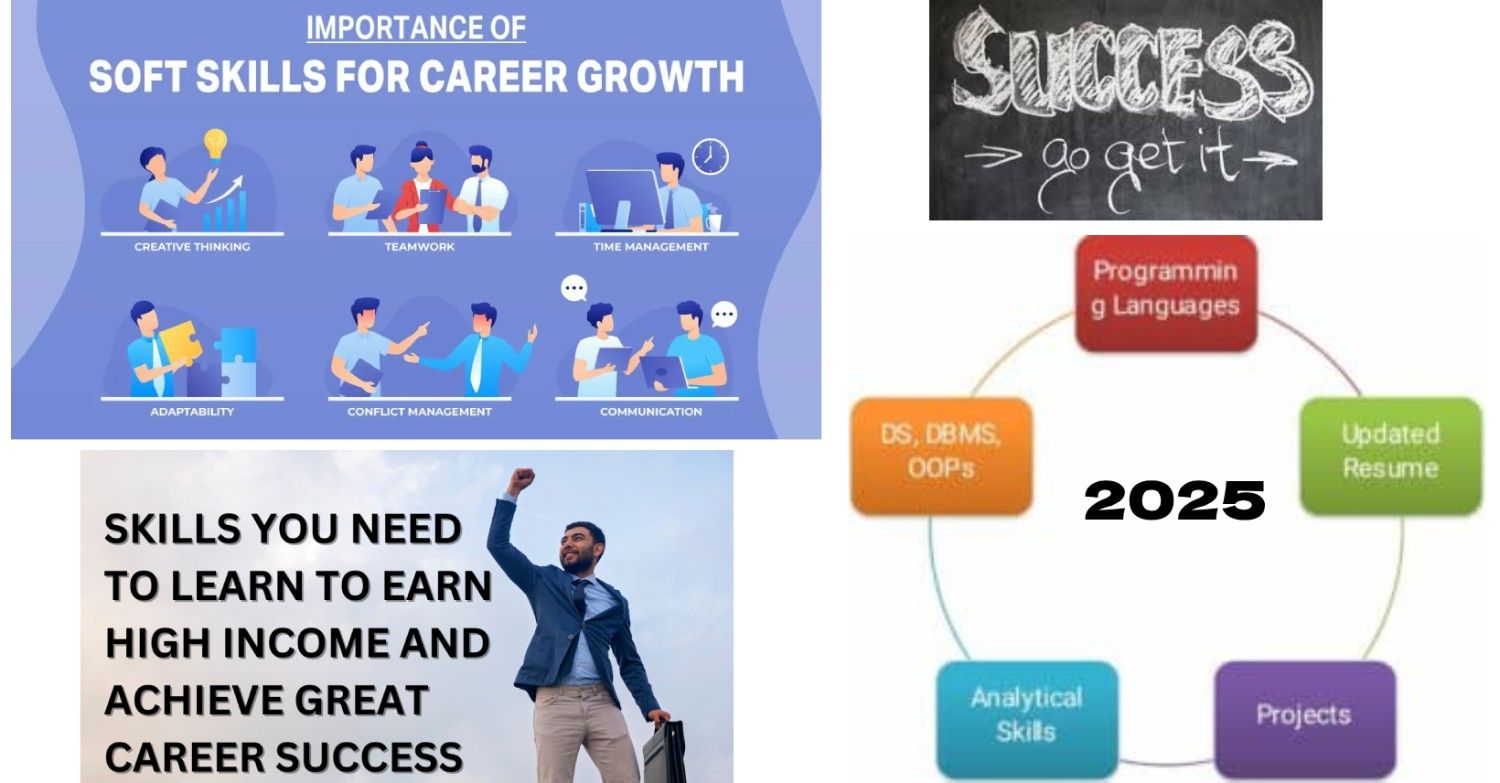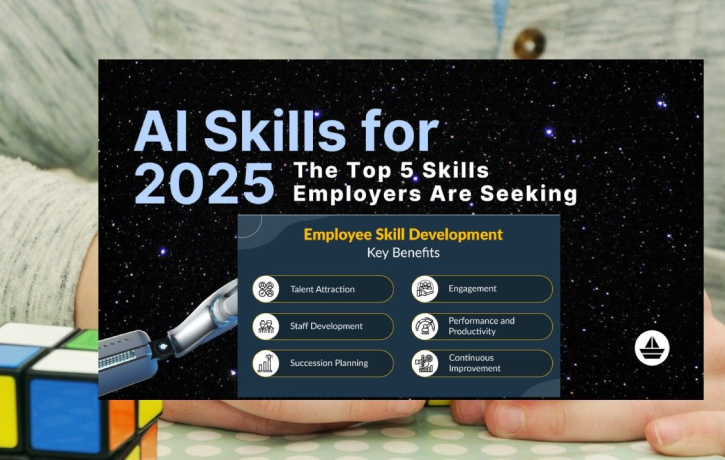- 1 1. AI and Automation Proficiency
- 2 2. Data Literacy and Analytical Thinking
- 3 3. Cybersecurity Competency
- 4 4. Emotional Intelligence (EQ)
- 5 5. Creative Problem-Solving
- 6 6. Leadership and People Management
- 7 7. Competency in Remote Work
- 8 8. Sustainability and Green Technologies
- 9 9. Networking and Relationship-Building
- 10 Conclusion: Future-Proof Your Career for Success in 2025

Top skills to master in 2025 for career success, with rapid evolution in technologies, shifting global trends, and new workplace dynamics, looking forward to 2025 will fashion the job market. In this fast-changing environment, mastering the right set of skills will be critical to success in one’s career. So, whether you are looking to advance within your current field or pivot into a new one altogether, developing a combination of technical, soft, and leadership skills will not only keep you ahead in the game but deliver long-term success.
In this article, we will explore the top skills to master for career success in 2025, covering everything from advanced technology proficiencies to emotional intelligence and creativity.
1. AI and Automation Proficiency
As we continue to ride the wave of the digital revolution, industries around the world will be disrupted in various ways by the integration of artificial intelligence (AI) and automation. Professionals who can understand, implement, and work alongside AI and automation technologies will be scarce and valuable.
Key Focus Areas:
AI tools and platforms: Know AI-driven platforms, such as GPT-4, TensorFlow, and OpenAI, to better understand their actual applications in your domain.
Automation of business processes: An idea on how companies can use RPA and workflow software to streamline operations as well as achieve increased efficiency.
Machine learning: Just an appreciation for basic algorithms that serve as the tools of the trade for the industries of marketing, health, and finance.
Why It Matters: The way of business is changing due to AI and automation, so professionals familiar with these technologies will find their jobs and organizations increasingly able to work more efficiently and remain competitive.
2. Data Literacy and Analytical Thinking
By 2025, data literacy will be an essential competency area in almost every industry. Understanding, interpreting, and leveraging data are skills for making better decisions by professionals from all fields.
Key Areas to Focus On:
Data visualization tools: Learn how to use tools such as Power BI, Tableau, or Google Data Studio for providing complex data in a simple and actionable format.
Statistical analysis: Be familiar with the techniques of data analysis: regression analysis, hypothesis testing, trend forecasting through software like Excel or Python.
Big data: Understand how organizations collect and analyze big data, and how to get meaningful insights out to enhance business strategy.
Why It Matters: Organizations rely more and more on data to support decisions, and data-analyzing professionals will be in an even stronger position to shape outcomes and strategies.
3. Cybersecurity Competency
Cyber threats are growing in sophistication, making cybersecurity competence crucial for career success in 2025. Cyber attacks, data breaches, and violations of privacy and confidentiality are some of the major threats to businesses, making cybersecurity the hottest target for organizations worldwide.
Key Areas to Focus On:
Basic cybersecurity principles: Learn fundamental concepts such as encryption, firewalls, and secure coding practices.
Cloud security: As more businesses migrate to cloud environments, understanding cloud security protocols (e.g., AWS Security, Microsoft Azure security) will be essential.
Compliance and regulations: Familiarize yourself with regulations like the GDPR (General Data Protection Regulation) or CCPA (California Consumer Privacy Act) to ensure data protection standards are met.
Why It Matters: Cybersecurity tops the list of concerns that businesses face in every industry. Individuals who know security best practices will be key in this organization’s efforts to protect company data and mitigate risks.
4. Emotional Intelligence (EQ)
Emotional intelligence (EQ) will remain an essential skill in the workplace in 2025. With continually diversifying businesses and workplaces becoming ever more virtual, there will be a great need for understanding and managing your own emotions, as well as those of others, when building productive relationships, leading teams, and resolving conflicts.
Focus Areas:
Self-awareness: Understand your emotions and how they affect actions and relationships with others.
Empathy: Practice empathy in understanding the feelings and thinking of others to build trust and collaboration.
Conflict resolution: Develop your skills in mediating differences and finding solutions that enhance team cohesion.
Why It Matters: A high EQ results in better communication, good leadership, and more harmonious team dynamics, all of which result in career success in a highly collaborative work environment that is people-centric.
5. Creative Problem-Solving
Creative problem-solving skills will remain one of the most sought-after skills in 2025, with businesses requiring innovative solutions to complex challenges and outwit their competitors. With the pace of technological change growing every day, there are many professionals who can think beyond the box and present problems from novel perspectives.
Focus Skills:
Design thinking: Learn the basics of design thinking, a creative problem-solving process based on empathy, ideation, and iteration to develop novel solutions.
Critical thinking: Improve your capacity to analyze situations logically, identify root issues, and assess various possible solutions.
Collaborative brainstorming: Improve your capacity to work with different teams in generating ideas and solving more complex problems.
Why It Matters: Companies are looking for people who can bring innovative, creative solutions to the table, particularly in industries that are disrupted constantly. Creative problem-solving will be key to staying in the game.
6. Leadership and People Management
Although organizations are growing and changing, leadership skills will always be crucial to career success. By 2025, leading will be less about authority and more about collaboration, having emotional intelligence, and guiding teams through constant change.
Key Focus Areas
Inclusive leadership: Develop skills to lead diverse groups, encourage inclusiveness, and foster an environment where each individual’s contribution is valued.
Change management: Develop a sense of guiding the team through transitions-innovation in technology, organizational change, or market change.
Coaching and mentoring: Develop skills to coach and mentor others, push their targets, and build the right culture among the members of the team.
Why It Matters: Organizations are increasingly embracing remote and hybrid work. Strong leadership skills will keep teams motivated, aligned, and productive in this kind of work environment.
7. Competency in Remote Work
Remote work will form a huge part of many industries in 2025. While remote work affords flexibility, there are challenges that come along with it, such as communication barriers, team cohesion, and managing your time. Mastering the skills required for successful remote working is crucial to career success.
Key Take Aways:
Time management: Learn to structure the day and be productive without a traditional office environment.
Virtual collaboration tools: Get comfortable with Slack, Zoom, Microsoft Teams, and Trello so that one can get in touch and collaborate and communicate well with the remote team.
Self-motivation: Develop the ability to stay focused and self-driven without direct supervision or in-person interactions.
Why It Matters: Remote work is here to stay. Professionals who can excel in a remote work environment will be more adaptable and competitive in 2025 and beyond.
8. Sustainability and Green Technologies
With the emerging concerns related to climate change, sustainability will become a keynote for businesses across all sectors. Professionals who understand sustainable practices, green technologies, and how to integrate them into the business operations will increasingly be in demand.
The major areas of relevance
Sustainable business practices: Understand and learn ways about carbon footprint reduction, green certifications, and eco-friendly initiatives.
Green tech innovations: Stay updated about the latest developments in renewable energy, electric vehicles, and sustainable agriculture.
Environmental regulations: Understand the global environmental standards, such as the Paris Agreement or regional regulations like the EU Green Deal.
Why It Matters: Companies are under pressure to adopt sustainable practices, and professionals who can help organizations meet environmental goals will be highly sought after.
9. Networking and Relationship-Building
Networking remains a cornerstone of career success, especially in 2025. As industries evolve, maintaining a robust network of professional connections will provide access to new opportunities, collaborations, and career advancement.
Key Areas to Focus On:
Build and maintain a strong personal brand on platforms like LinkedIn, promoting your areas of expertise and skills.
Strategic networking: attend industry events, webinars, and online forums related to a specific field.
Mentorship: seek mentors who can advise and are looking to mentor someone to create mutualism.
Why It Matters: Networking opens doors to new job opportunities, partnerships, and collaborations. A robust professional network is one of the most vital resources driving long-term career growth.
Conclusion: Future-Proof Your Career for Success in 2025
By mastering skills like those in this article, you position yourself to succeed in 2025 and beyond. The secret to thriving in the future of work is really a fusion of technical expertise combined with soft skills like emotional intelligence, leadership, and creativity. Being an adaptable worker, an innovator, and a collaborator will be your greatest assets as industries continue evolving.
Focusing on AI, data literacy, cybersecurity, emotional intelligence, and many other new concerns, you will be ready for challenges and opportunities that 2025 offers. Investing in these skills now will help future proof your career as well as keep you competitive and successful in the rapidly changing job market.






